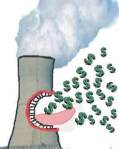
 State-owned utility doesn’t want to talk about nuclear plans http://www.thestate.com/news/local/article141313913.html 28 Mar 17, MONCKS CORNER, SC A state-owned electric utility doesn’t want to talk about its plans for dealing with possible construction problems at the V.C. Summer nuclear plant, where it is teaming with South Carolina Electric & Gas Co. to build two additional nuclear reactors.
State-owned utility doesn’t want to talk about nuclear plans http://www.thestate.com/news/local/article141313913.html 28 Mar 17, MONCKS CORNER, SC A state-owned electric utility doesn’t want to talk about its plans for dealing with possible construction problems at the V.C. Summer nuclear plant, where it is teaming with South Carolina Electric & Gas Co. to build two additional nuclear reactors.
The lead contractor of the $14 billion expansion, Westinghouse Electric Co., is experiencing serious financial problems amid media reports that it could file for bankruptcy protection.
Concerns are rising about how much it would cost to complete the plants and, in a worst case, whether the reactor project would be finished. The project already is about $3 billion over budget and years behind schedule.
Santee Cooper senior vice president and general counsel Michael Baxley would only say that a resolution approved by its board Monday in a closed telephone conference “authorizes certain contingency actions by management in the fluid situation with respect to new nuclear construction,’’ The Post and Courier reported.
Baxley would not elaborate, but said the plan would put the Moncks Corner utility “in a position to be able to immediately respond to issues or conditions that may occur with respect to the V.C. Summer project.”
Santee Cooper is responsible for 45 percent of the cost. SCE&G’s parent company, SCANA Corp., is paying the other 55 percent. The two utilities also share the costs of the existing nuclear reactor at the site in Fairfield County.
Santee Cooper spokeswoman Mollie Gore wouldn’t say Tuesday whether the power company would release the resolution.
“Santee Cooper is continuing to monitor the situation,’’ she said. “It is complicated. While they continue to work through the details, Santee Cooper can’t really provide any speculation about this.’’
SCANA has said it has a plan to complete the project, with or without Westinghouse and its parent company, Toshiba.
If Westinghouse sought bankruptcy protection, it could lead to higher rates for utility customers to help pay for the reactors, plant critics have said.
Staff writer Sammy Fretwell contributed.